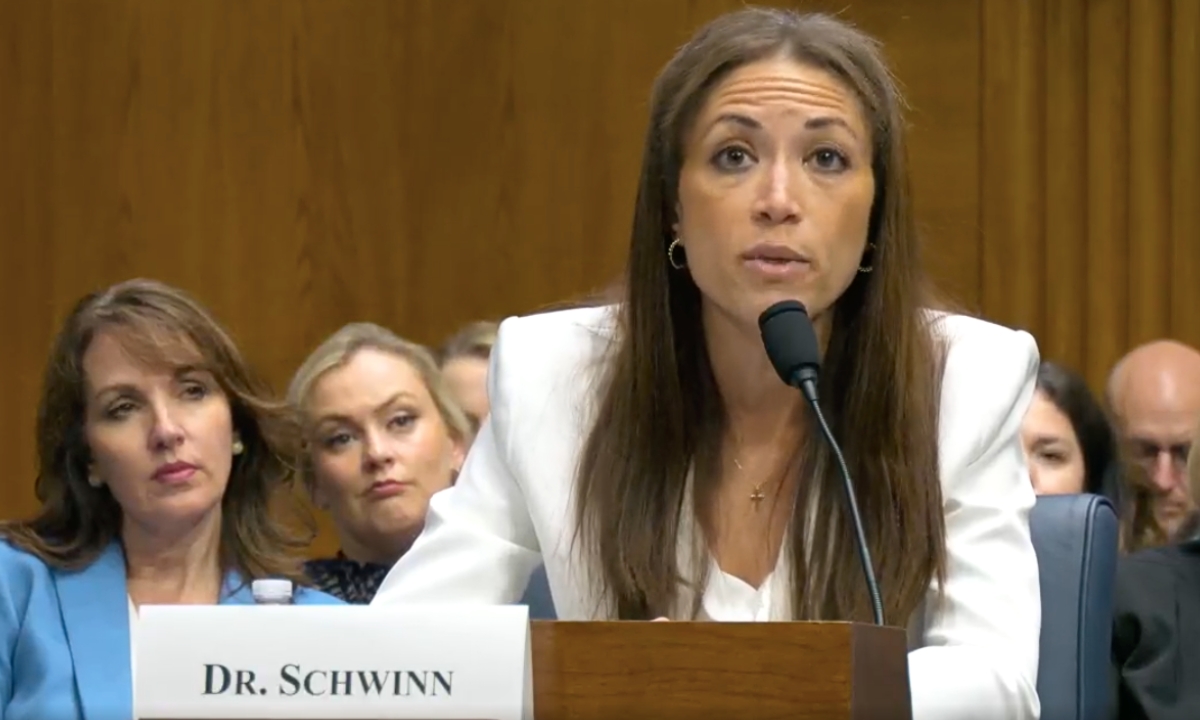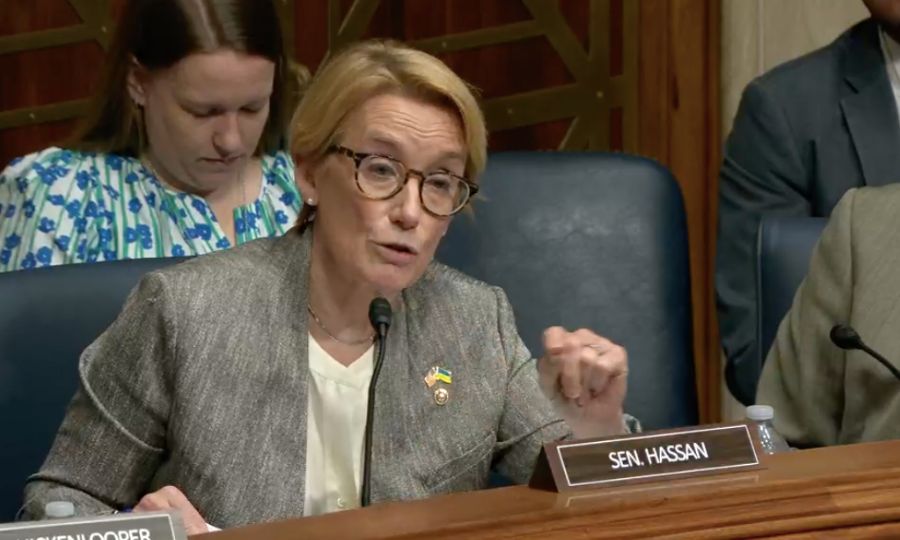Amid Calls to Close Education Department, Penny Schwinn Promises to Aid ‘Our Most Struggling Schools’
Under light questioning from senators, the deputy secretary nominee said she wants to create an ‘outcomes-oriented department.’

Get stories like this delivered straight to your inbox. Sign up for The 74 Newsletter
Despite strong opposition to her nomination from some conservative groups, Penny Schwinn faced relatively light questioning from senators Thursday as she seeks to become second in charge of the U.S. Department of Education.
Though Democrats probed where she stands on President Donald Trump’s plan to shutter the department, the former Tennessee education commissioner appeared to answer questions to their satisfaction.

Democratic Sen. Maggie Hassan of New Hampshire homed in on the administration’s move to end grants to train and hire K-12 school mental health professionals — part of a 2022 law that passed with bipartisan support.
“Do you think that what the department did helps or hurts the communities that were counting on the funding that they were promised?” she asked. “If confirmed, do you commit to reigning in the chaos and operational failures that we are seeing at the department?”
Schwinn said the department will open a new competition for those grants and promised to “have an efficient, effective and outcomes-oriented department.”
She voiced support for Trump’s ultimate goal to eliminate the department and repeatedly said states and local communities are in the best position to make decisions about education. As a charter school founder who served in the Delaware and Texas education agencies before leading Tennessee’s for four years, Schwinn has a reputation for working across the aisle. She pushed for reading reforms and using pandemic relief funds to implement a statewide tutoring program. A vote on her confirmation is expected in the coming days.
“What we need to do is ensure that we’ve created a system that is going to drive outcomes,” she told GOP Sen. Jim Banks of Indiana. “That is not going to happen from the federal government, whether there’s a Department of Education or not.”
At the same time, Schwinn implied that there is a role for the department in ensuring states intervene in their lowest-performing schools.
“There must be a commitment to ensuring that our most struggling schools improve because our students deserve that,” she said.
A 2024 report from the Government Accountability Office found that less than half of states are meeting those requirements under the Every Student Succeeds Act. Schwinn’s tenure in Tennessee, for example, included overseeing a state turnaround effort known as the Achievement School District. Considering it a failure, the state legislature recently shut it down and will try another approach.
“There’s real tension there,” Thomas Toch, director of FutureEd, a think tank at Georgetown University, told The 74. “Will the Trump administration make a meaningful commitment to school improvement? Or will [Education Secretary Linda] McMahon and her team dodge that responsibility in the name of local control?”
Some observers have called Schwinn a smart pick for her focus on improving reading achievement and her attempts to avoid some of the more divisive culture war debates of the post-pandemic era. But to others she has a troubled track record that includes contracts with vendors that gave the appearance of a conflict of interest. On Wednesday, The 74 reported that after Trump nominated her, she registered a new business in Florida with a longtime colleague. While the venture was ultimately dissolved, Schwinn’s sister replaced her as a manager a few weeks before the nominee submitted her financial disclosure documents.
Some parent groups have vehemently opposed her nomination, viewing her as more left-leaning than most Trump nominees.
“It amazes me that President Trump would consider Penny Schwinn conservative,” said Tiffany Boyd, a homeschool advocate who opposed Schwinn’s plan to conduct well-being checks on students during the pandemic. Schwinn nixed the idea after strong backlash. Boyd also cited a teacher recruitment effort that focused, in part, on attracting more teachers of color — efforts that the department now says push “illegal diversity, equity and inclusion.”
But none of that surfaced during the hearing. Even Republican Sen. Josh Hawley of Missouri, who has vowed to fight the “left’s indoctrination of students,” opted to skip direct questions to Schwinn and said he would submit them in writing.
The committee interviewed Schwinn as part of a panel, along with Kimberly Richey, Trump’s choice to lead the Office for Civil Rights, and two Department of Labor nominees. In that format, the senators focused on issues most important to them — for example, Chairman Bill Cassidy emphasized better serving students with dyslexia.
“As the Department of Education streamlines educational funding, how can we ensure that resources are there to identify and address an issue, specifically speaking of dyslexia?” he asked.
Schwinn touted Tennessee’s move to include “characteristics of dyslexia” as a disability category in its state education funding formula and ramp up screening of students’ early reading skills. The federal government, she said, could do a better job of guiding states on this issue and sharing lessons from states that have posted the greatest gains in literacy, like Mississippi and Louisiana.
Some advocates are eager to have an educator who prioritized reading instruction at the department.
“We love her track record of improving student outcomes in Tennessee and talking a bit more technically about literacy and the science of reading — which we think having leadership on the federal level around is going to be key,” said Keri Rodrigues, president of the National Parents Foundation.
But she stressed that it was federally funded research, now at risk under the Trump administration, that informed those improvements.
“The research and the funding for all these ‘state miracles,’ ” she said, “come from regional and federal efforts — which I think a lot of folks are forgetting.”
Get stories like these delivered straight to your inbox. Sign up for The 74 Newsletter

;)
